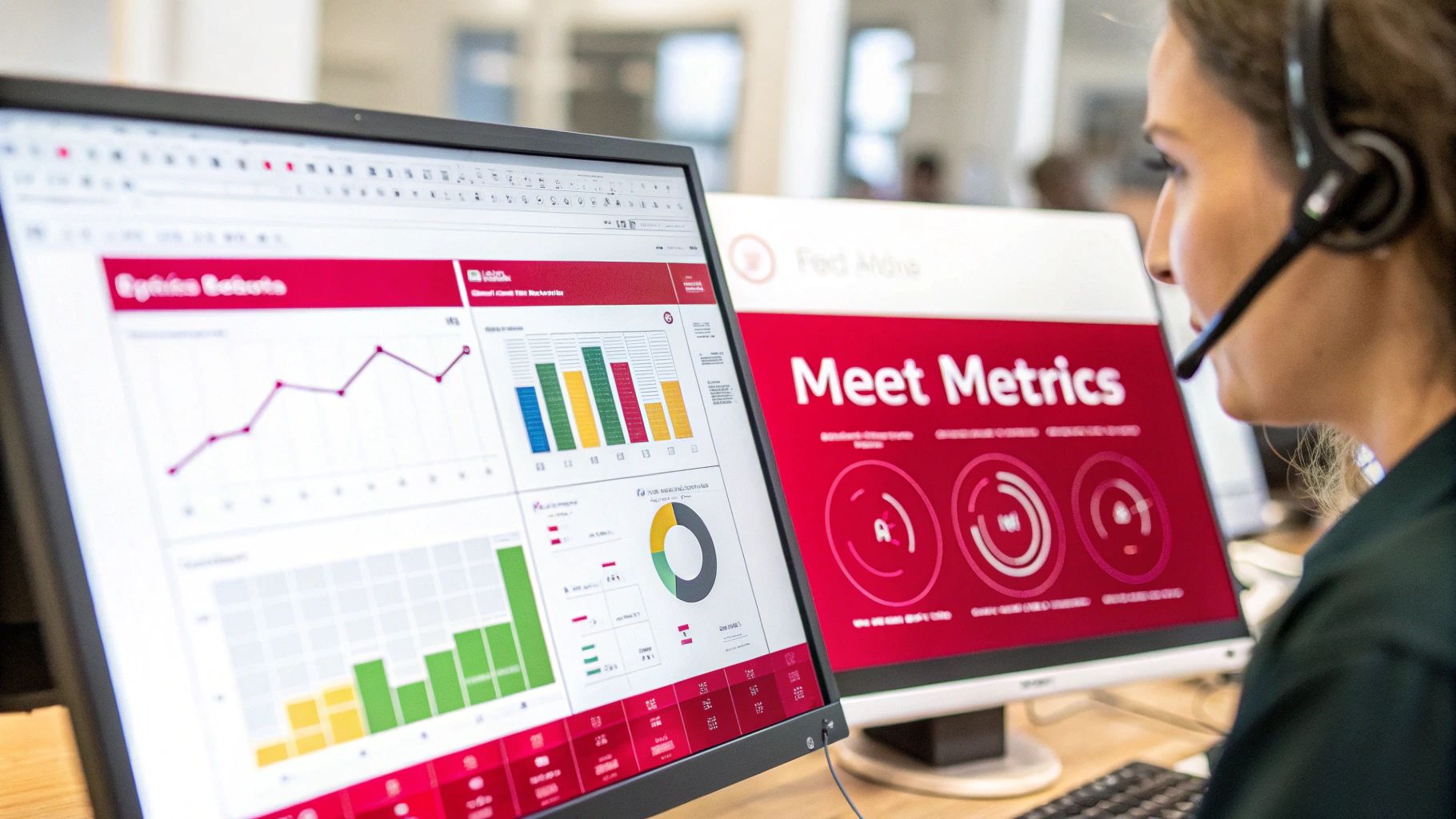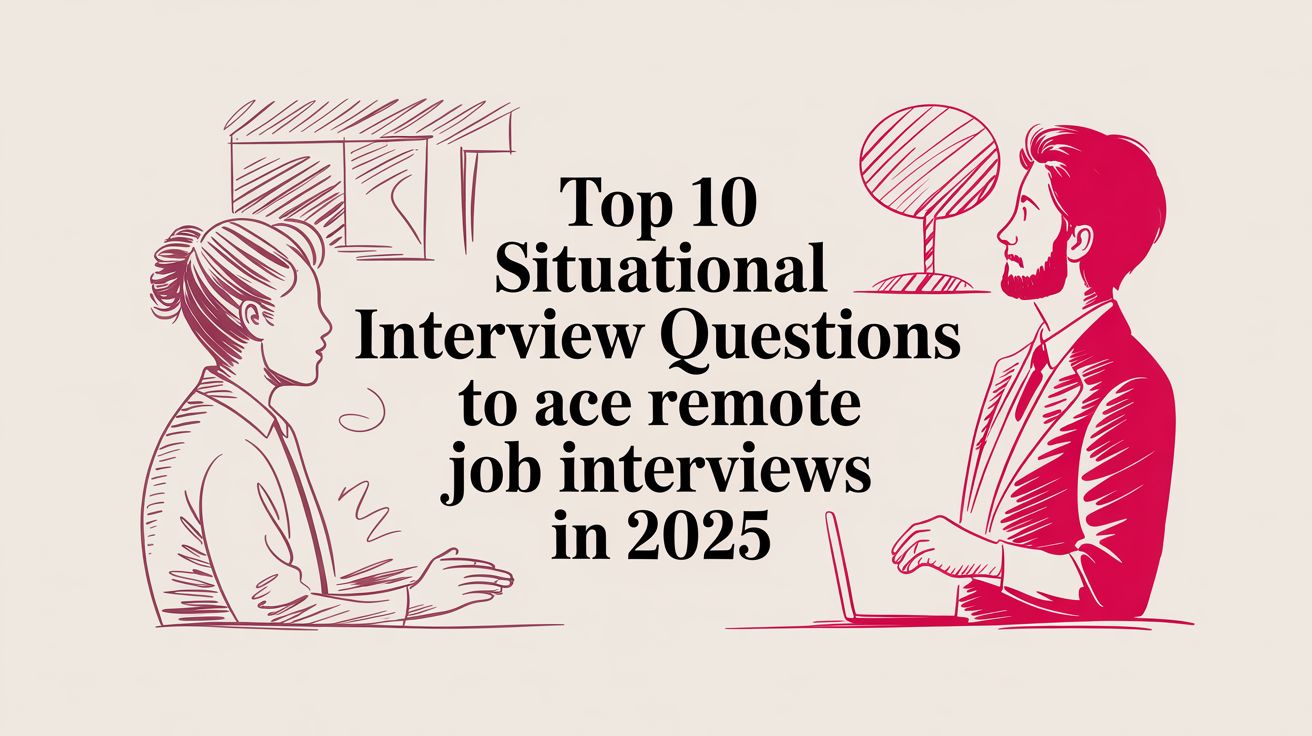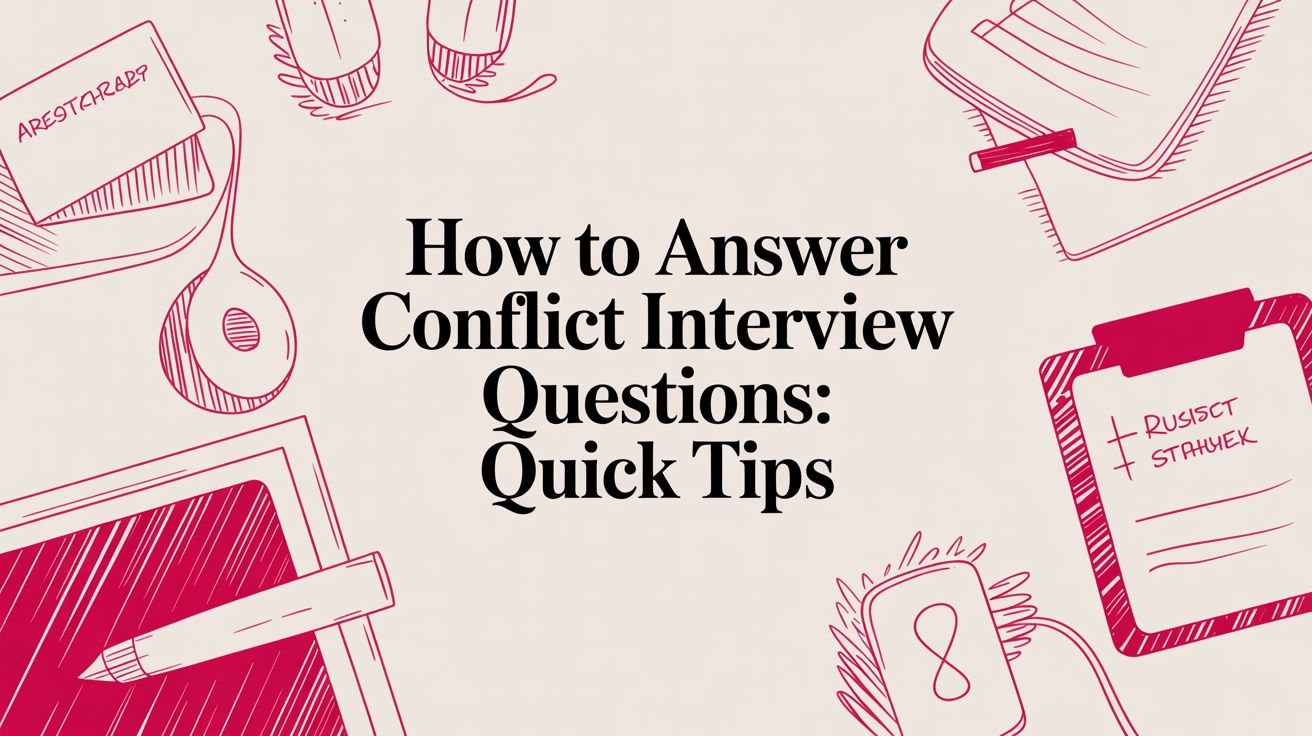Get Ready to Impress: Your Call Center Interview Prep Guide
Landing a call center job requires strong interview skills. This guide covers seven common call center interview questions to help you prepare. Learn how to answer questions about customer service experience, handling difficult customers, stress management, exceeding expectations, repetitive tasks, performance metrics, and even practice with a mock call scenario. Mastering these call center interview questions will significantly improve your chances of landing your ideal remote role.
1. Tell me about your customer service experience
“Tell me about your customer service experience” is a staple question in call center interview questions. It’s designed to evaluate a candidate’s background and determine if their experience translates well to the demands of a call center environment. Interviewers use this question to gauge how candidates have handled customer interactions in the past, their understanding of fundamental service principles, and their overall communication style. This helps them predict how a candidate might perform in a fast-paced, customer-centric role.

This question is crucial because it allows interviewers to assess several key features: the candidate’s prior customer service experience, their communication style, and their grasp of service fundamentals. This provides valuable insight into the candidate’s service philosophy and potential for success in a call center role. For candidates, it’s an easy question to prepare for, offering a chance to highlight transferable skills from various roles. Learn more about Tell me about your customer service experience and explore remote customer service opportunities.
Pros:
- Allows candidates to highlight transferable skills: Even if a candidate hasn’t worked in a call center before, they can demonstrate how skills from other customer-facing roles, such as retail or hospitality, are applicable.
- Provides insight into service philosophy: The way a candidate describes their past experiences reveals their understanding of and approach to customer service.
- Easy for candidates to prepare for: This is a common question, allowing candidates to prepare thoughtful and compelling examples in advance.
Cons:
- May disadvantage entry-level candidates: Those with limited work experience may struggle to provide detailed examples, even if they possess the necessary aptitude.
- Can lead to rehearsed responses: The predictability of the question can encourage overly practiced answers that lack authenticity.
- Might not reveal adaptability to new situations: While past experiences are valuable, they may not fully indicate how a candidate would handle unfamiliar challenges in a call center setting.
Examples of Strong Answers:
- Describing a specific challenging customer interaction and explaining the steps taken to resolve it, highlighting problem-solving and empathy. For example, “I once had a customer who was extremely upset about a delayed delivery. I actively listened to their concerns, empathized with their frustration, and offered a solution that went above and beyond their expectations, ultimately turning a negative experience into a positive one.”
- Mentioning quantifiable achievements, such as CSAT scores or retention rates. For example, “In my previous role, I consistently maintained a 95% customer satisfaction rating by proactively addressing customer needs and providing efficient support.”
- Discussing experience across multiple communication channels (phone, email, chat) showcases versatility and adaptability.
Tips for Answering:
- Focus on specific examples: Avoid vague statements and provide concrete examples of your customer service experience.
- Quantify achievements when possible: Use metrics to demonstrate your success in previous roles.
- Highlight skills specifically relevant to phone-based customer service: Emphasize active listening, clear communication, and the ability to handle difficult conversations over the phone.
- Emphasize active listening and problem-solving abilities: These are critical skills for success in a call center environment.
This question’s popularity in call center interviews is reinforced by its inclusion in various customer service training programs, call center management methodologies, and industry standards like those set by COPC (Customer Operations Performance Center). Its effectiveness in identifying suitable candidates ensures its continued use as a key component of the call center interview process.
2. How would you handle an angry customer?
This is a staple in almost every call center interview question repertoire. It’s designed to assess how you react under pressure, navigate conflict, and ultimately, preserve customer satisfaction. Interviewers use this scenario-based question to gauge your emotional intelligence, de-escalation techniques, problem-solving approach, and empathy levels. By asking how you would handle a hypothetical situation, they aim to predict your actual job performance and get a glimpse into your stress management abilities and customer-centric mindset.

This question deserves its place on the list because it goes beyond technical skills and delves into essential soft skills critical for call center success. Features such as assessing de-escalation techniques and evaluating the problem-solving approach provide valuable insights for the interviewer. A major benefit is its ability to predict actual on-the-job performance. However, relying solely on this question has its drawbacks. Hypothetical responses don’t always mirror real-life reactions, candidates might offer memorized techniques, and company-specific protocols might be overlooked.
Successful implementation often involves structured approaches like the HEARD method (Hear, Empathize, Apologize, Resolve, Diagnose) or the LAST approach (Listen, Apologize, Solve, Thank). For instance, a strong answer might involve actively listening to the customer’s complaint without interruption, empathizing with their frustration (“I understand this must be incredibly frustrating for you”), offering a sincere apology (even if the issue isn’t directly your fault), and proposing concrete solutions. Sharing a real-life example of successfully turning around an angry customer interaction demonstrates your capability and adds weight to your claims. Learn more about How would you handle an angry customer? This resource can be particularly helpful for those looking for remote customer support roles, a field where handling such situations effectively is paramount.
Here are some actionable tips to help you prepare for this common call center interview question:
- Emphasize active listening: Begin your answer by showcasing your ability to listen attentively. This is the foundation of de-escalation.
- Demonstrate empathy without taking abuse personally: Show that you understand the customer’s frustration without internalizing their anger.
- Explain a structured approach to resolution: Mentioning the HEARD or LAST methods, or a similar framework, demonstrates a thoughtful and organized approach.
- Include examples of successfully de-escalating situations: Illustrate your experience with specific, concise examples.
- Mention when you would appropriately escalate to a supervisor: Knowing when a situation requires intervention from a higher authority is essential.
The importance of handling angry customers effectively has been popularized by various resources and individuals, including Robert Bacal’s ‘Defusing Hostile Customers Workbook’, The DiSC behavioral assessment methodology, and customer experience leader Tony Hsieh (former Zappos CEO). Their work underscores the critical role of emotional intelligence and effective communication in providing exceptional customer service.
3. How do you handle stressful situations or high call volumes?
This call center interview question is a crucial one for any prospective agent. It aims to understand how you manage pressure, prioritize tasks, and maintain composure during challenging periods. Call centers are often fast-paced environments with fluctuating call volumes and demanding customers. Therefore, demonstrating resilience and effective stress management techniques is key to landing the job. This question deserves its place on the list of common call center interview questions because it directly addresses a candidate’s suitability for the inherent demands of the role.
What it Evaluates:
This question probes several key areas:
- Stress Management Techniques: Interviewers want to know your specific coping mechanisms for handling stress in real-time. Do you practice deep breathing? Do you take short mental breaks? Understanding your strategies provides insight into your ability to remain calm and professional under pressure.
- Prioritization Skills: High call volumes often require agents to juggle multiple tasks simultaneously. This question explores your ability to prioritize calls, messages, and other responsibilities effectively, ensuring that urgent matters are addressed promptly.
- Self-Awareness: Your answer reveals your understanding of your own stress triggers and limitations. Recognizing these factors is crucial for developing effective coping strategies and preventing burnout.
- Resilience: The ability to bounce back from challenging calls or difficult customers is essential for long-term success in a call center environment. This question helps assess your ability to recover quickly and maintain a positive attitude.
Pros of Asking This Question:
- Identifies candidates who can thrive in fast-paced environments: Those with strong stress management techniques are more likely to perform well under pressure and adapt to the demands of a busy call center.
- Reveals time management approaches: The way a candidate prioritizes tasks during high call volumes provides insights into their organizational skills and time management abilities.
- Helps predict burnout potential: Candidates who lack self-awareness or effective coping mechanisms are at higher risk of experiencing burnout. This question can help identify potential issues early on.
Cons of Asking This Question:
- Candidates may provide idealized rather than realistic answers: Interviewees may be tempted to present a polished version of themselves, making it difficult to gauge their true ability to handle stress.
- Difficult to verify without actual observation: It’s challenging to assess a candidate’s stress management skills in an interview setting. Real-world performance may differ significantly.
- May not account for different types of workplace stressors: The question may not cover the specific stressors present in a particular call center environment.
Examples of Strong Answers:
- “I use the 4-7-8 breathing technique between calls to help manage stress and refocus. I also prioritize tasks based on urgency and importance, using a simple to-do list to keep track of everything.”
- “During a particularly hectic period, I developed a system for tagging and prioritizing emails to ensure that urgent requests were addressed immediately. This helped me manage the increased workload and avoid feeling overwhelmed.”
- “I once experienced an unexpected surge in calls due to a system outage. I remained calm, focused on providing accurate information to each caller, and collaborated with my team to manage the situation effectively.”
Tips for Answering This Question:
- Mention specific stress management techniques you use: Be specific about the strategies you employ, whether it’s deep breathing, mindfulness, or taking short breaks.
- Discuss how you maintain call quality even during busy periods: Emphasize your ability to remain professional and provide excellent customer service, even under pressure.
- Explain how you prioritize tasks when overwhelmed: Describe your approach to task management and prioritization, demonstrating your organizational skills.
- Describe how you practice self-care to prevent burnout: Highlighting your commitment to self-care shows that you are proactive about managing stress and preventing burnout.
- Share examples of adapting to sudden increases in workload: Provide concrete examples of how you have successfully handled stressful situations or unexpected surges in workload in the past.
Popularized By:
The focus on stress management in call centers has been influenced by several factors, including the development of call center workforce management systems, time management methodologies like the Pomodoro Technique, and the increasing popularity of mindfulness practices in workplace settings.
4. Describe a time when you went above and beyond for a customer
This classic call center interview question, “Describe a time when you went above and beyond for a customer,” is a staple in behavioral-based interviews. Interviewers use it to gauge your dedication to customer satisfaction, problem-solving skills, and overall service philosophy. It helps them understand how you define “excellent customer service” and predict your future performance based on past actions. This question is crucial for call center roles as it directly relates to the core function of the job: providing exceptional support and resolving customer issues effectively. It reveals not just your competence, but also your initiative and willingness to exceed expectations, traits highly valued in customer-centric environments.

This question effectively assesses a candidate’s service attitude and reveals their underlying values and motivations. It allows hiring managers to identify individuals who are naturally inclined to provide outstanding service, rather than just meeting the minimum requirements. By asking for specific examples, interviewers gain insights into the candidate’s problem-solving creativity and their ability to think outside the box to achieve positive customer outcomes. Furthermore, it demonstrates the candidate’s level of initiative, highlighting their proactive approach to customer service.
Examples of Successful Implementation:
- Researching beyond working hours: A customer service representative who spent their lunch break researching an obscure product issue for a customer, ultimately resolving a problem that had been plaguing them for weeks.
- Proactive follow-up: An agent who called a customer back after their shift to follow up on a complex problem and ensure the solution was working effectively.
- Identifying systemic improvements: Someone who identified a pattern in customer complaints and proposed a system-wide solution to prevent similar issues from arising in the future.
Tips for Answering This Call Center Interview Question:
- Use the STAR Method: Structure your response using the Situation, Task, Action, Result framework. This provides a clear and concise narrative that interviewers can easily follow.
- Show Initiative: Choose examples that showcase your proactive nature and willingness to go the extra mile, rather than simply fulfilling your basic job duties.
- Quantify the Impact: Whenever possible, quantify the positive results of your actions. Did you increase customer satisfaction scores? Did you save the company money? Concrete numbers add weight to your story.
- Explain Your Motivation: Briefly explain why you chose to go above and beyond. This demonstrates your genuine commitment to customer service and helps the interviewer understand your service philosophy.
- Connect to Company Values: If possible, link your example to the company’s stated service philosophy or mission statement. This shows you’ve researched the company and understand their values.
Pros and Cons of This Question:
Pros:
- Predictive of Future Performance: Behavioral questions are highly effective at predicting future behavior, as they are based on past experiences.
- Highlights Customer-Centricity: This question directly addresses the candidate’s focus on the customer experience.
- Reveals Service Values and Motivation: It provides insight into the candidate’s underlying values and motivations related to customer service.
Cons:
- Limited Experience: Candidates with limited experience may struggle to come up with compelling examples.
- Verification Challenges: It can be difficult for interviewers to verify the accuracy of the examples provided.
- Potential for Exaggeration: Candidates might be tempted to exaggerate their contributions.
This question’s popularity stems from the widespread adoption of the STAR interview method and behavioral interviewing techniques championed by industrial psychologists. Furthermore, customer service experts like Shep Hyken emphasize the importance of exceeding customer expectations, further reinforcing the value of this question in assessing call center candidates. This question remains a critical component of call center interviews as it directly assesses the skills and qualities essential for success in this customer-focused field.
5. How do you handle repetitive tasks while maintaining quality?
This is a crucial call center interview question because it directly addresses the core nature of the work: handling often repetitive customer interactions while consistently delivering high-quality service. This question probes how candidates approach the potential monotony of the job and reveals their strategies for staying engaged, motivated, and detail-oriented, even when performing similar tasks repeatedly. Understanding this aspect is vital for both the candidate and the employer, ensuring a good fit and predicting long-term job satisfaction and performance. This question deserves its place in the list of top call center interview questions because it’s a strong indicator of a candidate’s potential for success in this demanding environment.
This question assesses several key attributes essential for call center success:
- Attention to detail: Can the candidate maintain focus and accuracy, even during repetitive processes?
- Consistency capabilities: Will they apply the same level of service and follow procedures consistently across all interactions?
- Engagement strategies: How do they plan to stay motivated and avoid burnout in a role that can often feel repetitive?
- Quality mindset: Do they prioritize quality and understand its importance, even in routine tasks?
Why is this question asked? Employers want to gauge a candidate’s ability to thrive in a call center environment. They need to know if the candidate has realistic expectations about the job and has developed coping mechanisms to handle the repetitive nature of the work while consistently meeting quality standards. It also helps identify candidates who possess intrinsic motivation and a genuine desire to help customers, regardless of the repetition involved.
Examples of Successful Implementation:
- Using checklists: “I use a personal checklist to ensure I cover all necessary points on each call, even when the customer issues are similar. This helps me stay organized and avoid missing crucial details.”
- Personalizing interactions: “Even if I’m answering the same question repeatedly, I focus on treating each customer as an individual. I listen actively to their specific concerns and tailor my responses accordingly, acknowledging their unique situation.”
- Setting personal goals: “I set daily or weekly goals for myself, such as aiming for a certain number of positive customer feedback or resolving a specific type of issue efficiently. These challenges help me stay engaged and motivated.”
Actionable Tips for Answering This Call Center Interview Question:
- Discuss specific techniques: Don’t just say you “stay focused.” Describe specific methods you use, such as mindfulness exercises, short breaks, or changing up your routine.
- Explain how you personalize interactions: Provide concrete examples of how you tailor your approach to each customer, even during repetitive tasks.
- Mention how you find meaning in repetitive work: Connecting the work to a larger purpose, like helping people solve problems or contributing to the company’s success, can demonstrate a positive attitude and long-term potential.
- Share how you maintain energy throughout a shift: Discuss strategies like staying hydrated, taking short walks, or listening to upbeat music during breaks.
- Describe quality control methods you use personally: This could include double-checking your work, reviewing call recordings, or seeking feedback from colleagues.
Pros of asking this question:
- Directly applicable to call center reality: Provides valuable insight into a candidate’s preparedness for the actual work environment.
- Identifies sustainability in performance: Helps predict whether a candidate can maintain quality and engagement over time.
- Reveals personal motivation techniques: Offers a glimpse into a candidate’s self-awareness and resourcefulness.
Cons of asking this question:
- Difficult to assess without observing actual work: A candidate’s described strategies may not translate into real-world performance.
- Candidates may not have considered this challenge: Less experienced candidates may not have developed effective coping mechanisms yet.
- May reveal job fit issues: The candidate’s response may indicate they are not suited for the repetitive nature of call center work.
The principles behind successfully answering this question are rooted in established concepts like call center quality assurance methodologies, gamification techniques used to boost workplace engagement, and Mihaly Csikszentmihalyi’s concept of “flow” – achieving a state of deep focus and enjoyment in an activity. By understanding these concepts and preparing a thoughtful response, candidates can demonstrate their readiness to handle the demands of a call center role and excel in providing consistent, high-quality service.
6. How comfortable are you with meeting metrics and performance targets?
This call center interview question is a crucial one for both the interviewer and the interviewee. It probes the candidate’s understanding of the metrics-driven environment inherent in most call centers and assesses their comfort level with being measured against quantifiable performance indicators. These indicators can include metrics like average call handling time, first call resolution rate, customer satisfaction scores (CSAT), and sales conversions, depending on the specific role and the call center’s focus. This question helps determine whether a candidate is likely to thrive under pressure and consistently achieve desired outcomes. This is essential for maintaining service levels, achieving business objectives, and ensuring a productive work environment.

This question deserves its place on the list of common call center interview questions because it addresses several key aspects of a candidate’s suitability for the role. Specifically, it:
- Assesses Metric Awareness: It reveals whether the candidate understands the key performance indicators (KPIs) commonly used in call centers.
- Tests Goal Orientation: It explores the candidate’s motivation and drive to achieve targets and contribute to overall team success.
- Evaluates Performance Under Measurement: It gauges how well the candidate handles the pressure of being constantly monitored and assessed based on their performance data.
- Reveals Accountability Comfort: It uncovers the candidate’s comfort level with taking ownership of their performance and being accountable for meeting specific targets.
Pros of asking this question:
- Identifies candidates who thrive in measured environments: Some individuals excel under the structure and clarity provided by performance metrics. This question helps pinpoint those individuals.
- Reveals understanding of call center operations: A candidate’s response can demonstrate their familiarity with the operational realities of a call center environment.
- Helps predict adaptability to performance management: It provides insight into how well the candidate is likely to respond to feedback and coaching based on their performance data.
Cons of asking this question:
- May cause anxiety in otherwise qualified candidates: The pressure of discussing performance metrics can be intimidating for some, even if they are capable of meeting them.
- Could encourage unrealistic claims about performance abilities: Candidates might exaggerate their past achievements to impress the interviewer.
- Might not account for quality vs. quantity balance: Focusing solely on metrics can sometimes overshadow the importance of providing high-quality customer service.
Examples of strong responses:
- “In my previous role, I consistently exceeded my target for first call resolution by 15% while maintaining a customer satisfaction score above 95%. I achieved this by implementing a new knowledge base system and proactively identifying areas for improvement in my call handling process.”
- “I believe in a balanced approach to metrics. While speed is important, it shouldn’t come at the expense of quality. I prioritize understanding the customer’s needs thoroughly to ensure a complete resolution on the first call, even if it takes slightly longer.”
- “Tracking my average handle time has been instrumental in improving my efficiency. I identified areas where I could streamline my process and reduce unnecessary steps, leading to a 10% improvement in my call handling speed.”
Tips for answering this question effectively:
- Demonstrate understanding of common call center KPIs: Familiarize yourself with metrics like average handle time, first call resolution, customer satisfaction, and service level.
- Discuss how you’ve used metrics for self-improvement: Share examples of how you’ve leveraged performance data to identify areas for growth and enhance your skills.
- Share specific strategies for meeting targets: Explain your approach to achieving goals and maintaining consistent performance.
- Express a balanced view on quality vs. quantity: Emphasize your commitment to providing excellent customer service while also meeting efficiency targets.
- Ask clarifying questions about the company’s specific performance expectations: This demonstrates your proactive nature and interest in understanding the role’s requirements.
This question’s popularity has been fueled by the increasing adoption of data-driven management methodologies in call centers, including Six Sigma, the Balanced Scorecard approach, and benchmarking organizations like The Call Center School. By understanding this context, candidates can better prepare to answer this question effectively and demonstrate their readiness to succeed in a metrics-driven environment.
7. Role-play scenario: Handle this mock customer call
One of the most effective call center interview questions involves a role-play scenario simulating a real customer interaction. This technique allows interviewers to gauge a candidate’s practical abilities beyond theoretical knowledge and scripted answers. It provides a direct window into how they would handle actual on-the-job situations, making it a valuable tool for assessing suitability for call center roles. This approach is particularly useful when evaluating candidates for remote call center positions, as highlighted in this article: Learn more about Role-play scenario: Handle this mock customer call.
This practical assessment typically involves the interviewer acting as a customer with a specific problem or inquiry. The candidate is then expected to respond and resolve the issue as they would in a real call center environment. This real-time skill demonstration tests various crucial aspects, including active listening, improvisation abilities, adherence to scripts (where applicable), and their natural conversational style. It reveals the candidate’s actual service style, providing valuable insights that traditional question-and-answer formats often miss.
Features of this technique:
- Real-time skill demonstration: Shows how a candidate performs under pressure.
- Tests active listening: Evaluates how well they understand customer needs.
- Evaluates improvisation abilities: Assesses their ability to handle unexpected situations.
- Assesses script adherence or natural conversation: Checks their ability to balance standardized responses with personalized service.
- Reveals actual service style: Provides a glimpse into their customer interaction approach.
Pros:
- Provides direct evidence of capabilities: Offers tangible proof of their skills.
- Difficult to fake or rehearse: Reduces the likelihood of candidates presenting a polished but inaccurate portrayal of their abilities.
- Simulates actual job requirements: Provides a realistic preview of daily tasks.
- Shows how candidates think on their feet: Assesses problem-solving and decision-making in real-time.
Cons:
- Creates interview pressure that may not reflect normal performance: The artificial environment can induce stress and affect performance.
- May advantage naturally confident candidates: Those comfortable with improvisation may outperform equally skilled but less confident individuals.
- Limited in scope to one type of interaction: A single scenario may not represent the full spectrum of customer interactions.
Examples of Role-Play Scenarios:
- Handling a product return: The “customer” requests a return due to a defect or dissatisfaction.
- Dealing with service outage complaints: The “customer” is experiencing a service disruption and demands a resolution.
- Managing an account-related inquiry: The “customer” has questions about their billing or account details.
- Navigating a complex technical support issue: The “customer” needs help troubleshooting a technical problem.
- Responding to a customer seeking to cancel service: The “customer” wants to cancel their subscription or service.
Tips for Candidates:
- Listen carefully before responding: Understand the customer’s issue fully before offering solutions.
- Ask clarifying questions when needed: Don’t hesitate to seek further information to ensure accurate understanding.
- Show empathy through verbal cues: Demonstrate genuine concern and understanding for the customer’s situation.
- Follow a logical troubleshooting process (if applicable): Approach technical issues systematically.
- Balance efficiency with thoroughness: Aim to resolve the issue quickly while providing adequate support.
- End with a satisfaction check: Ensure the “customer” feels heard and their issue is resolved.
- Practice common scenarios before interviews: Prepare for potential role-play situations by rehearsing common customer interactions.
This role-play approach, popularized by assessment center methodologies, customer service training programs, and mystery shopping evaluation techniques, provides invaluable insights into a candidate’s true potential. It’s a highly effective addition to any call center interview process, ensuring that selected individuals possess the practical skills needed to excel in the role.
Key Competency Comparison of 7 Call Center Interview Questions
| Question Title | Implementation Complexity 🔄 | Resource Requirements ⚡ | Expected Outcomes 📊 | Ideal Use Cases 💡 | Key Advantages ⭐ |
|---|---|---|---|---|---|
| Tell me about your customer service experience | Low - straightforward Q&A | Low - verbal response only | Insight into candidate’s experience & mindset | Screening for relevant customer service skills | Easy to prepare; highlights transferable skills |
| How would you handle an angry customer? | Moderate - scenario-based | Moderate - needs thoughtful answers | Reveals conflict resolution & emotional intelligence | Assessing stress & empathy handling | Predicts job performance; shows stress management |
| How do you handle stressful situations or high call volumes? | Moderate - behavioral question | Low to moderate - verbal response | Assesses resilience and prioritization | Evaluating stress management & adaptability | Identifies fast-paced environment fit |
| Describe a time when you went above and beyond for a customer | Moderate - past behavior example | Moderate - requires candidate reflection | Reveals initiative and service attitude | Behavioral interview for service excellence | Predicts future performance; shows motivation |
| How do you handle repetitive tasks while maintaining quality? | Low to moderate - self-awareness focus | Low - verbal explanation | Insights into consistency and engagement | Evaluating routine task performance | Reveals sustainability and personal motivation |
| How comfortable are you with meeting metrics and performance targets? | Low - direct question | Low - verbal response | Shows metric awareness and accountability | Screening for data-driven performance areas | Identifies candidates thriving under measurement |
| Role-play scenario: Handle this mock customer call | High - live simulation | High - interviewer involvement | Direct observation of skills in action | Final-stage interviews, practical skill check | Hard to fake; shows real-time problem-solving |
Level Up Your Career: Find Remote Call Center Opportunities
Mastering call center interview questions is the key to unlocking a world of exciting remote career possibilities. Throughout this article, we’ve covered essential questions, from handling difficult customers and stressful situations to demonstrating your ability to go the extra mile. The key takeaways are to prepare thoughtful answers that showcase your experience, highlight your problem-solving skills, and emphasize your dedication to providing exceptional customer service. Preparing for a call center interview? Check out this resource with a comprehensive list of questions to help you practice and ace your interview: 100 battle-tested questions for hiring customer support representatives from Screendesk. By understanding how to address these common call center interview questions, you’ll be well-equipped to present yourself confidently and impress potential employers.
By internalizing these concepts and practicing your responses, you’ll significantly increase your chances of landing your dream remote call center role. This preparation not only helps you ace the interview but also equips you with the skills to excel in your new position and thrive in a remote work environment. Now that you’re ready to take the next step, start your search for the perfect remote opportunity. Visit Remote First Jobs to discover a wide range of remote call center positions and launch your exciting new career.



